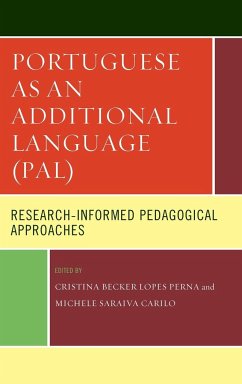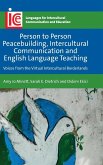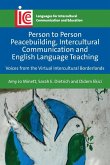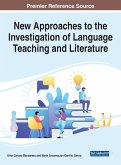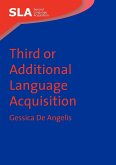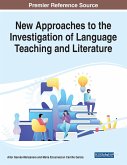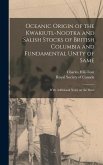Portuguese as an Additional Language (PAL)
Research-Informed Pedagogical Approaches
Herausgeber: Lopes Perna, Cristina Becker; Carilo, Michele Saraiva
Portuguese as an Additional Language (PAL)
Research-Informed Pedagogical Approaches
Herausgeber: Lopes Perna, Cristina Becker; Carilo, Michele Saraiva
- Gebundenes Buch
- Merkliste
- Auf die Merkliste
- Bewerten Bewerten
- Teilen
- Produkt teilen
- Produkterinnerung
- Produkterinnerung
This book examines current methods related to the teaching and acquisition of Portuguese as an additional language. Drawing on research-led teaching and empirical research, this book offers fourteen chapters on innovative initiatives to further PAL as a productive field.
Andere Kunden interessierten sich auch für
![Person to Person Peacebuilding, Intercultural Communication and English Language Teaching Person to Person Peacebuilding, Intercultural Communication and English Language Teaching]() Amy Jo MinettPerson to Person Peacebuilding, Intercultural Communication and English Language Teaching131,99 €
Amy Jo MinettPerson to Person Peacebuilding, Intercultural Communication and English Language Teaching131,99 €![Person to Person Peacebuilding, Intercultural Communication and English Language Teaching Person to Person Peacebuilding, Intercultural Communication and English Language Teaching]() Amy Jo MinettPerson to Person Peacebuilding, Intercultural Communication and English Language Teaching41,99 €
Amy Jo MinettPerson to Person Peacebuilding, Intercultural Communication and English Language Teaching41,99 €![New Approaches to the Investigation of Language Teaching and Literature New Approaches to the Investigation of Language Teaching and Literature]() New Approaches to the Investigation of Language Teaching and Literature213,99 €
New Approaches to the Investigation of Language Teaching and Literature213,99 €![Third or Additional Language Acquisition Third or Additional Language Acquisition]() Gessica De AngelisThird or Additional Language Acquisition36,99 €
Gessica De AngelisThird or Additional Language Acquisition36,99 €![Making Connections Making Connections]() John CorbettMaking Connections60,99 €
John CorbettMaking Connections60,99 €![New Approaches to the Investigation of Language Teaching and Literature New Approaches to the Investigation of Language Teaching and Literature]() New Approaches to the Investigation of Language Teaching and Literature165,99 €
New Approaches to the Investigation of Language Teaching and Literature165,99 €![Oceanic Origin of the Kwakiutl-Nootka and Salish Stocks of British Columbia and Fundamental Unity of Same: With Additional Notes on the Déné Oceanic Origin of the Kwakiutl-Nootka and Salish Stocks of British Columbia and Fundamental Unity of Same: With Additional Notes on the Déné]() Charles Hill-ToutOceanic Origin of the Kwakiutl-Nootka and Salish Stocks of British Columbia and Fundamental Unity of Same: With Additional Notes on the Déné28,99 €
Charles Hill-ToutOceanic Origin of the Kwakiutl-Nootka and Salish Stocks of British Columbia and Fundamental Unity of Same: With Additional Notes on the Déné28,99 €-
-
-
This book examines current methods related to the teaching and acquisition of Portuguese as an additional language. Drawing on research-led teaching and empirical research, this book offers fourteen chapters on innovative initiatives to further PAL as a productive field.
Hinweis: Dieser Artikel kann nur an eine deutsche Lieferadresse ausgeliefert werden.
Hinweis: Dieser Artikel kann nur an eine deutsche Lieferadresse ausgeliefert werden.
Produktdetails
- Produktdetails
- Verlag: Lexington Books
- Seitenzahl: 310
- Erscheinungstermin: 15. Januar 2023
- Englisch
- Abmessung: 235mm x 157mm x 23mm
- Gewicht: 656g
- ISBN-13: 9781666914382
- ISBN-10: 166691438X
- Artikelnr.: 65696622
- Herstellerkennzeichnung
- Libri GmbH
- Europaallee 1
- 36244 Bad Hersfeld
- gpsr@libri.de
- Verlag: Lexington Books
- Seitenzahl: 310
- Erscheinungstermin: 15. Januar 2023
- Englisch
- Abmessung: 235mm x 157mm x 23mm
- Gewicht: 656g
- ISBN-13: 9781666914382
- ISBN-10: 166691438X
- Artikelnr.: 65696622
- Herstellerkennzeichnung
- Libri GmbH
- Europaallee 1
- 36244 Bad Hersfeld
- gpsr@libri.de
Edited by Cristina Becker Lopes Perna and Michele Saraiva Carilo - Contributions by Graziela Andrighetti; Aline Jéssica Antunes; Michele Saraiva Carilo; Eugênia Fernandes; Luciane Corrêa Ferreira; Luis Gonçalves; Rachel Mamiya Hernandez; Ana Paula Huback;
Part 1: Development of Specific Skills in Portuguese as an Additional
Language
Chapter 1. Portuguese as a Welcoming Language and the Challenges of
Writing: the Case of the Brazilian Exam to Access Higher Education (ENEM)
Chapter 2. Teaching Portuguese as a Welcoming Language for Haitians: What
Choices Can We Make?
Chapter 3. Developing Grammar Skills: Perceptions of Heritage Learners of
Portuguese in a Third-year University Course
Chapter 4. Developing Writing Skills in an Intercultural Communicative
Approach in Portuguese as a Foreign Language
Chapter 5. Online Teacher Education in Portuguese as an Additional
Language: Development and Enactment of a Comprehensive Curriculum for a
Postgraduate Program
Part 2: Development of Language Awareness in Portuguese as an Additional
Language
Chapter 6. Language Variation and Change in Portuguese as a Foreign
Language
Chapter 7. Leveraging Learners' Multilingualism in the Portuguese Classroom
Chapter 8. Complex Dynamic Systems Theory and the Teaching of Portuguese as
a Pluricentric Language: Emerging Practices and Identities
Chapter 9. Metaphor Awareness Raising in Additional Language: Comprehension
and Teaching Issues
Part 3: Development of Innovative Pedagogical Approached in Portuguese as
an Additional Language
Chapter 10. A Game-changer: Open Educational Resources (OERs) in the
Teaching of Portuguese
Chapter 11. Promoting Linguistic Citizenship in Classroom with the
Interactional Sociolinguistics Approach
Chapter 12. Teaching Portuguese with Intent: Project-based Learning in the
Creation of a Wikipedia Page
Chapter 13. Project-Based Language Learning in Online Environments:
Fostering Intercultural Competence through Telecollaborative Projects
Chapter 14. From Comparative/Contrastive Methods to Critical and
Intercultural Pedagogies: A New Approach to Portuguese for Spanish Speakers
in a Higher Education Context
Language
Chapter 1. Portuguese as a Welcoming Language and the Challenges of
Writing: the Case of the Brazilian Exam to Access Higher Education (ENEM)
Chapter 2. Teaching Portuguese as a Welcoming Language for Haitians: What
Choices Can We Make?
Chapter 3. Developing Grammar Skills: Perceptions of Heritage Learners of
Portuguese in a Third-year University Course
Chapter 4. Developing Writing Skills in an Intercultural Communicative
Approach in Portuguese as a Foreign Language
Chapter 5. Online Teacher Education in Portuguese as an Additional
Language: Development and Enactment of a Comprehensive Curriculum for a
Postgraduate Program
Part 2: Development of Language Awareness in Portuguese as an Additional
Language
Chapter 6. Language Variation and Change in Portuguese as a Foreign
Language
Chapter 7. Leveraging Learners' Multilingualism in the Portuguese Classroom
Chapter 8. Complex Dynamic Systems Theory and the Teaching of Portuguese as
a Pluricentric Language: Emerging Practices and Identities
Chapter 9. Metaphor Awareness Raising in Additional Language: Comprehension
and Teaching Issues
Part 3: Development of Innovative Pedagogical Approached in Portuguese as
an Additional Language
Chapter 10. A Game-changer: Open Educational Resources (OERs) in the
Teaching of Portuguese
Chapter 11. Promoting Linguistic Citizenship in Classroom with the
Interactional Sociolinguistics Approach
Chapter 12. Teaching Portuguese with Intent: Project-based Learning in the
Creation of a Wikipedia Page
Chapter 13. Project-Based Language Learning in Online Environments:
Fostering Intercultural Competence through Telecollaborative Projects
Chapter 14. From Comparative/Contrastive Methods to Critical and
Intercultural Pedagogies: A New Approach to Portuguese for Spanish Speakers
in a Higher Education Context
Part 1: Development of Specific Skills in Portuguese as an Additional
Language
Chapter 1. Portuguese as a Welcoming Language and the Challenges of
Writing: the Case of the Brazilian Exam to Access Higher Education (ENEM)
Chapter 2. Teaching Portuguese as a Welcoming Language for Haitians: What
Choices Can We Make?
Chapter 3. Developing Grammar Skills: Perceptions of Heritage Learners of
Portuguese in a Third-year University Course
Chapter 4. Developing Writing Skills in an Intercultural Communicative
Approach in Portuguese as a Foreign Language
Chapter 5. Online Teacher Education in Portuguese as an Additional
Language: Development and Enactment of a Comprehensive Curriculum for a
Postgraduate Program
Part 2: Development of Language Awareness in Portuguese as an Additional
Language
Chapter 6. Language Variation and Change in Portuguese as a Foreign
Language
Chapter 7. Leveraging Learners' Multilingualism in the Portuguese Classroom
Chapter 8. Complex Dynamic Systems Theory and the Teaching of Portuguese as
a Pluricentric Language: Emerging Practices and Identities
Chapter 9. Metaphor Awareness Raising in Additional Language: Comprehension
and Teaching Issues
Part 3: Development of Innovative Pedagogical Approached in Portuguese as
an Additional Language
Chapter 10. A Game-changer: Open Educational Resources (OERs) in the
Teaching of Portuguese
Chapter 11. Promoting Linguistic Citizenship in Classroom with the
Interactional Sociolinguistics Approach
Chapter 12. Teaching Portuguese with Intent: Project-based Learning in the
Creation of a Wikipedia Page
Chapter 13. Project-Based Language Learning in Online Environments:
Fostering Intercultural Competence through Telecollaborative Projects
Chapter 14. From Comparative/Contrastive Methods to Critical and
Intercultural Pedagogies: A New Approach to Portuguese for Spanish Speakers
in a Higher Education Context
Language
Chapter 1. Portuguese as a Welcoming Language and the Challenges of
Writing: the Case of the Brazilian Exam to Access Higher Education (ENEM)
Chapter 2. Teaching Portuguese as a Welcoming Language for Haitians: What
Choices Can We Make?
Chapter 3. Developing Grammar Skills: Perceptions of Heritage Learners of
Portuguese in a Third-year University Course
Chapter 4. Developing Writing Skills in an Intercultural Communicative
Approach in Portuguese as a Foreign Language
Chapter 5. Online Teacher Education in Portuguese as an Additional
Language: Development and Enactment of a Comprehensive Curriculum for a
Postgraduate Program
Part 2: Development of Language Awareness in Portuguese as an Additional
Language
Chapter 6. Language Variation and Change in Portuguese as a Foreign
Language
Chapter 7. Leveraging Learners' Multilingualism in the Portuguese Classroom
Chapter 8. Complex Dynamic Systems Theory and the Teaching of Portuguese as
a Pluricentric Language: Emerging Practices and Identities
Chapter 9. Metaphor Awareness Raising in Additional Language: Comprehension
and Teaching Issues
Part 3: Development of Innovative Pedagogical Approached in Portuguese as
an Additional Language
Chapter 10. A Game-changer: Open Educational Resources (OERs) in the
Teaching of Portuguese
Chapter 11. Promoting Linguistic Citizenship in Classroom with the
Interactional Sociolinguistics Approach
Chapter 12. Teaching Portuguese with Intent: Project-based Learning in the
Creation of a Wikipedia Page
Chapter 13. Project-Based Language Learning in Online Environments:
Fostering Intercultural Competence through Telecollaborative Projects
Chapter 14. From Comparative/Contrastive Methods to Critical and
Intercultural Pedagogies: A New Approach to Portuguese for Spanish Speakers
in a Higher Education Context

